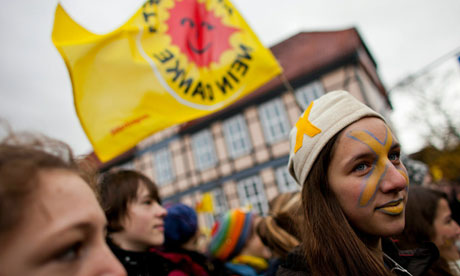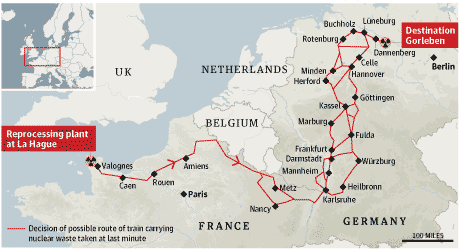Anti-nuclear rally protests against 'Chernobyl on wheels'
Protesters confront Areva shipment of 123 tonnes of radioactive waste on 900-mile run from France to Germany

About 30,000 anti-nuclear protesters are expected to demonstrate tomorrow against a shipment of highly radioactive nuclear waste, nicknamed "Chernobyl on wheels", that is being moved across France and Germany by train.
Although the exact route of the convoy is being kept secret, protesters have organised demonstrations at cities along its 900-mile route.
At least 17,000 German riot police are poised for what could be one of the biggest anti-nuclear demonstrations in years. By early this afternoon hundreds of activists had chained themselves to trees along the route or were preparing to lock themselves to the railway track.
 Possible routes for the nucear waste train's 900-mile journey
Possible routes for the nucear waste train's 900-mile journeyThe specially constructed low-speed train, carrying 123 tonnes of German radioactive waste, which was reprocessed in eastern France, started out today from Valognes, Normandy, near La Hague. It was expected to cross the French-German border early tomorrow and to arrive in Gorleben, in the far north-east of Lower Saxony, a few hours later.
Yannick Rousselet, of Greenpeace, said: "Never in history has such a quantity of radioactive material ever been transported."
Laura Hameaux, of Sortir du Nucléaire, a network of 875 anti-nuclear groups, said: "It is at least twice the radioactivity of all the radioactive pollution from the Chernobyl catastrophe and [local people] haven't even been informed of its route."
The waste convoy is the 11th of its type between France and Germany since 1996. In 2004 an anti-nuclear protester died in France after his leg was cut off by a train transporting nuclear waste to Germany. He had been sitting on the railway track.
Protesters have tried to block previous trains, but protests over the latest convoy have been boosted in Germany by growing public anger at the decision by Angela Merkel's government to extend the life of the country's existing nuclear power plants for an extra 12 years.
The decision is a reversal of one of the policy achievements of the government of the former Social Democratic chancellor Gerhard Schröder. Areva, the industrial conglomerate and leader in nuclear power, has agreements with Germany, Japan, Switzerland, Belgium and Holland to reprocess spent fuel from nuclear power plants. It receives, stores and processes the fuel, which remains the property of the country that produced it; the waste is sent back after treatment.
The latest shipment of waste will arrive in the German town of Dannenberg tomorrow and be transported the final 12 miles by lorry to Gorleben to be dumped into underground shafts. There are doubts about the safety of the storage following evidence of a high danger of groundwater contamination at the site.
Rebecca Harms, a Green MEP, said she expected the protest to be the biggest for years. "This year's transport of nuclear waste will provoke more opposition than ever before. It's time that people's concerns are finally listened to." she said.
Greenpeace has warned that the load contains even higher than normal levels of radioactive waste, due to the fact that the rods were in use for longer than usual.
Police and politicians have called for the nuclear industry, and not the taxpayer, to foot the €50m (£43m) bill the security operation is expected to cost.
Areva said today: "All operations related to these transports and the equipment used comply with the relevant national and international regulations that have been issued with the involvement of representatives from member states." The company insists the waste containers have been designed to withstand a 50-metre fall on to concrete and a fire of 800C (1,472F) lasting 30 minutes.
Christophe Neugnot, Areva spokesman, called Greenpeace's action a smokescreen avoiding "the real issue of the rebirth of nuclear power throughout Europe". He said: "If we want to produce electricity all the time at a reduced price and without heating up the planet we cannot do without nuclear. Renewable energies remain insufficient today. This convoy is less radioactive than six similar transports carried out by Areva in the last few years. We have nothing to hide." Greenpeace is suing Areva for what is says is "illegal storage of waste" at Valognes.
Anti-nuclear protesters said they were not aiming to hold up the convoy but highlight the failure of the nuclear industry to find long-term solutions to the waste it produces. Every year about 7,000 cubic metres of waste are produced by the 143 nuclear reactors in the EU. "It's like thinking up the idea of an aeroplane without thinking of where it's going to land," Rousselet said.
Waste disposal
The radioactive by-products of nuclear fission were processed by heating the waste until the liquid evaporated and formed a powder which was then "vitrified" – fused with glass in a melting furnace. The molten glass was then poured into stainless steel canisters, left to cool and fitted with a welded cover. The canisters, weighing 400kg each, are being carried in 11 train wagons made of forged steel or cast iron that have been used to transport nuclear waste between France and Germany since 1996. Another four carriages in the train are occupied by French CRS – armed riot police – ready to intervene in the event of security breaches. Helicopters are flying over the train paying particular attention to bridges and possible obstacles on the railway line. On arrival the estimated 308 canisters will be removed from their casks and buried into rock.





No comments:
Post a Comment